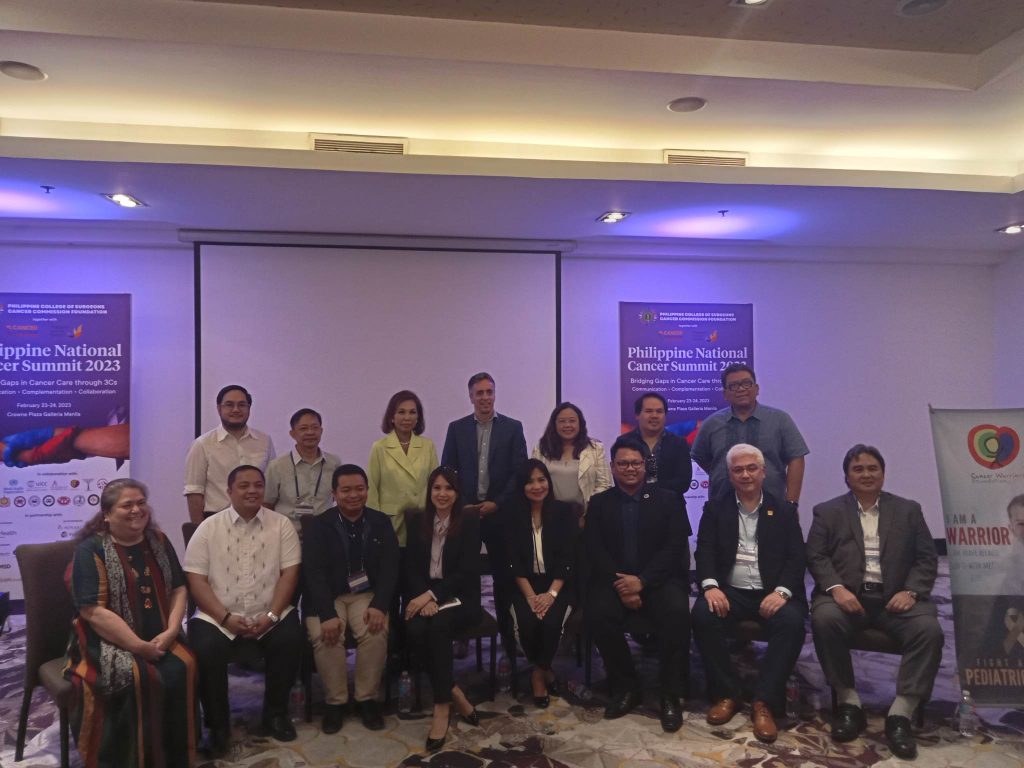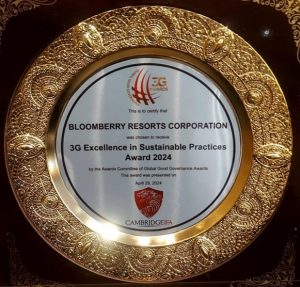National summit calls for urgent action, multistakeholder collaboration to bridge cancer care gaps

Cancer is now the second leading cause of death in the country, with 153,751 new cases and 254 deaths reported every day. Breast, lung and colorectal cancers are the top three in terms of incidence while lung cancer ranks number 1 in mortality.
Enacted in February 2019, the National Integrated Cancer Control Act (NICCA) aims to boost cancer control efforts, improve survivorship and reduce the burden of disease. What makes the NICCA law distinctive is it was crafted and written by members of patient support organizations belonging to Cancer Coalition Philippines (CCPh), with inputs from medical societies, professional organizations and civil society. It also generated widespread support and momentum from legislative champions and political leaders, whose lives have been touched by cancer.
Against this backdrop, the Philippine National Cancer Summit will take place on February 23-24, 2023 at the Crowne Plaza Galleria Manila in Quezon City to call on stakeholders to take urgent action and collaborate more synergistically in bridging gaps and transforming cancer care, in the whole country.

The hybrid summit (face-to-face plus online for some session segments ) is being organized by the Philippine College of Surgeons Cancer Commission Foundation (PCS CanCom), in partnership with the CCPh, Philippine Cancer Society (PCS), and the Department of Health (DOH).
With the theme “Bridging Gaps in Cancer Care through 3Cs: Communication, Complementation and Collaboration”, the summit will serve as an opportunity to share knowledge, expertise, experiences, research, good practice models, best practices and social innovations to advance integrated, multidisciplinary, patient-focused, quality cancer care and management.
The Board of Directors of PCS- CanCom said: “The core of quality cancer care is an integrated and multidisciplinary team approach that brings together healthcare professionals from different fields as well as patients and their families, to communicate, complement and collaborate with one another, for a holistic plan to improve quality of life and treatment outcomes. Yet, to dwell on treatment alone is not enough.”
Cancer control spans the whole cancer continuum from prevention, screening/ diagnosis, treatment, palliative and supportive care to survivorship, rehabilitation, end of life and bereavement care.
It involves a whole of government and whole of society to take action hand in hand. The #PNCS will bridge this gap from identifying challenges to addressing the issues and finding appropriate, sustainable and scalable solutions.
The summit will provide a platform for cancer patients and survivors to share their cancer journeys, and enable healthcare professionals, and other stakeholders, to learn from their lived experiences. Throughout the forum, it will seek to encourage strategic discussions among healthcare professionals, cancer advocates, program managers, and decision-makers on how to build capacities for health promotion and cancer prevention, better screening, early diagnosis, quality treatment and care, palliative care and survivorship care.
Moreover, sessions will be held to pinpoint and discuss effective strategies, to create more responsive patient care pathways, referral, and service delivery networks, for managing complex cancer cases that cannot be addressed in basic healthcare facilities.
It will also endeavor to form a consensus on priority actions to reduce the catastrophic effects on families of the financial burden of cancer care and treatment.
Finally, the summit will explore how digital transformation and data science can strengthen evidence-based governance and empower patients and patient groups to make informed decisions and shape policy recommendations.
At the center of the discussions are patient organizations belonging to the CCPh, a national coalition which advocated for the enactment of the country’s landmark law on cancer. Among the patient groups that are members of the CCPh are the Philippine Cancer Society, Cancer Warriors Foundation, ICanServeFoundation, Project: Brave Kids, and Carewell.
The CCPH Team affirms that at the heart of integrated and multidisciplinary care of cancer patients is collaboration, complementation and coordination of the health team, the patients and their families.
“By fully engaging with patients and their families in the cancer journey, the quality of care and its responsiveness to patient needs and family concerns is greatly improved. This leads to better health outcomes and a more positive patient journey. Beyond all these is a need for activating 3Cs with all stakeholders and ensuring that the promises of NICCA are fully implemented. We all have roles to play to help save more lives, reduce distress and emotional burden of the cancer journey and ensure a better future for people living with cancer and the survivors,” said the CCPh.
The CCPh underscored that equally important to operationalizing collaboration, complementation and coordination is ensuring access to care that is timely, equitable and sustainable.
The two-day summit will feature key government officials, representatives of international and local NGOs, patient leaders, and CEOs from the healthcare industry as speakers and resource persons.
Various symposia and breakout sessions for healthcare professionals and cancer care advocates will also be held during the event.
The Program: Speakers and Focus
On day 1, PCS CanCom Chairman Dr. Manuel Francisco Roxas, PCS President Dr. Corazon Ngelangel, CCPh Founding Member and Vice President Ms. Kara Magsanoc-Alikpala, will give the welcome remarks. Dr Rachel Rosario, a childhood cancer and adult cancer survivor will share her cancer journey from patient to advocate.
Dr. Andre Ilbawi, Global Cancer Program Lead, World Health Organization (WHO)- Geneva, will talk on “Emerging Challenges and Trends in Cancer Care: Pathways for Collaboration” via livestream from the WHO headquarters in Geneva, Switzerland. DOH OIC-Secretary Rosario Singh-Vergeire will speak about “Working Together in Localizing and Scaling Up NICCA Implementation” in her video message while WHO Philippines Officer-in-Charge Dr. Graham Harrison, for his part, will deliver a special message of support recognizing Philippine initiatives and commitment to cancer control.
Meanwhile, National integrated cancer control Council Vice Chairman Dr. Samuel Ang will give an overview of while NICCA Council Secretariat Head Mr. Vince Sumergido will present the accomplishments and contributions of the Council. Department of Budget and Management (DBM) Secretary Amenah F. Pangandaman will discuss “Advancing NICCA Implementation and Localization through Sustainable Financing”. Department of Migrant Workers Secretary Susan Ople will talk on institutionalizing cancer awareness & advocacy programs.
Mr. Paolo Borromeo, President & CEO Ayala Healthcare Holdings, Inc., and Managing Director, Ayala Corporation, will share his insights on “The Catalytic Role of Private-Public Partnerships in Bridging the Cancer Care Gap”. Dr. Harish Pillai, CEO of Metro Pacific Health will share their hospital’s vision in “Improving Cancer Services in the Philippines.”
The day 2 of the summit will feature a series of sessions on cancer registry, cancer research and oncology financing. Resource speakers in the session on “Advancing Cancer Registry and Cancer Research” will delve on strengthening population-based cancer registry in the country, institutionalizing hospital-based cancer registry, the Philippine Cancer Center’s role in national cancer care, the development plan and architecture for scaling up cancer research, and lessons and insights that the Philippines can learn from collaborative cancer research in Europe. For the session on “A Closer Look at Cancer Centers”, resource speakers will share their insights on the key dimensions, challenges and opportunities of establishing and operating cancer centers and how the Philippine General Hospital (PGH) Cancer Institute is reconfiguring the future of cancer care in the country’s public sector.
Former OIC Secretary of Health and NICCA champion, Dr. Paulyn Ubial, will discuss via video message why cancer financing is a must for successful and sustainable NICCA implementation. In the session on “Unpacking Oncology Financing in the Philippines: Key Challenges and Future Pathways for Action”, resource speakers will speak about the economic cost of cancer in the Philippines, PhilHealth’s potential contributions to ensure sustainable cancer support, alternatives to improve affordability beyond pricing in the country’s first dedicated cancer hospital, next-generation sequencing biomarker testing in lung cancer, and the use of biosimilars in reducing the economic burden of cancer treatment.
Also a part of the panel on the NICCA implementation and vision for the future are Cancer Control Act primary authors Senator Jose Victor “JV” Ejercito, and Quezon City Councilor Alfred Vargas, Department of Education Assistant Secretary Dexter Galban, House Committee on Health Secretary Mr. Erwin Lara representing chairman Representative Ciriaco Gato, Cancer Coalition Philippines Vice President Ms Carmen Auste, Mr. Orlando Oxales, Co-convenor of Citizen Watch and UHC Watch, Philippine Society of Medical Oncology President Dr. Rosario Pitargue, and Pharmaceutical and Healthcare Association of the Philippines (PHAP) Executive Director Mr. Teodoro Padilla.
During the closing ceremony, attendees will be urged to give their message of support and message of hope, and wishes for the future, to patients and survivors, carers and families, and the medical professionals and volunteer healthcare workers. Their messages and wishes will be placed on symbolic leaves of the Tree of Life, taking inspiration from the International Childhood Cancer Day awareness campaign.
The tree of life symbolizes hope for better care, better health outcomes and increased survivorship. It also gives tribute to the carers, family members, medical frontliners and healthcare volunteers who are working with patients, their families, stakeholders from the government and the private sector, to transform cancer care and reshape the future of cancer patients, people living with cancer and the cancer survivors.




